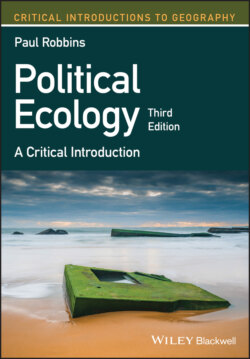Читать книгу Political Ecology - Paul Robbins - Страница 16
What is Political Ecology?
ОглавлениеThe term political ecology is a generous one that embraces a range of definitions. A review of the term from its early use (first used to describe this kind of work by Wolf in 1972) to its most recent manifestations shows important differences in emphasis. Some definitions stress political economy, while others point to more formal political institutions; some stress environmental change, while others emphasize narratives or stories about that change (see Table 1.1). Even so, there seems to be a set of common elements. The many definitions together suggest that political ecology represents an explicit alternative to “apolitical” ecology, that it works from a common set of assumptions, and that it employs a reasonably consistent mode of explanation.
Table 1.1 Defining political ecology.
| Author/source | Definition of “political ecology” | Goal |
| Cockburn and Ridgeway (1979) | “a useful way of describing the intentions of radical movements in the United States, in Western Europe and in other advanced industrial countries … very distant from the original rather sedate operations of the ecolobby” (p. 3) | Explicate and describe first‐world urban and rural environmental degradation from corporate and state mismanagement; document social activism in response. |
| Blaikie and Brookfield (1987) | “combines the concerns of ecology and a broadly defined political economy. Together this encompasses the constantly shifting dialectic between society and land‐based resources, and also within classes and groups within society itself” (p. 17) | Explain environmental change in terms of constrained local and regional production choices within global political economic forces, largely within a third‐world and rural context. |
| Greenberg and Park (1994) | A synthesis of “political economy, with its insistence on the need to link the distribution of power with productive activity and ecological analysis, with its broader vision of bio‐environmental relationships” (p. 1) | “Synthesize the central questions asked by the social sciences about the relations between human society, viewed in its bio‐cultural‐political complexity, and a significantly humanized nature” (p. 1). |
| Peet and Watts (1996b) | “a confluence between ecologically rooted social science and the principles of political economy” (p. 6) | Locates “movements emerging from the tensions and contradictions of under‐production crises, understands the imaginary basis of their oppositions and visions for a better life and the discursive character of their politics, and sees the possibilities for broadening environmental issues into a movement for livelihood entitlements, and social justice” (pp. 38–39). |
| Forsyth (2003) | “the politics of ecology as a scientific legitimization environmental policy” (p. 4) | To “establish the political forces behind different accounts of ‘ecology’ as a representation of biophysical reality” (p. 4) |
| Heynen, Kaika, and Swyngedouw (2006b) | “formulating political projects that are radically democratic in terms of the organization of the processes through which the environments that we (humans and non‐humans) inhabit become produced” (p. 2) | To “untangle the interconnected economic, political, social and ecological processes that together form highly uneven urban socio‐physical landscapes” (p. 16) |
| Bridge, McCarthy, and Perreault (2015a) | An environmental research field marked by a set of “common commitments” to “critical social theory”, to “in‐depth, direct observation involving qualitative methods”, and a “normative political commitment to social justice and structural political change” (pp. 7–8) | “not just to explain social and environmental processes, but to construct an alternative understanding of them, with an orientation to social justice and radical politics” (p. 8) |
